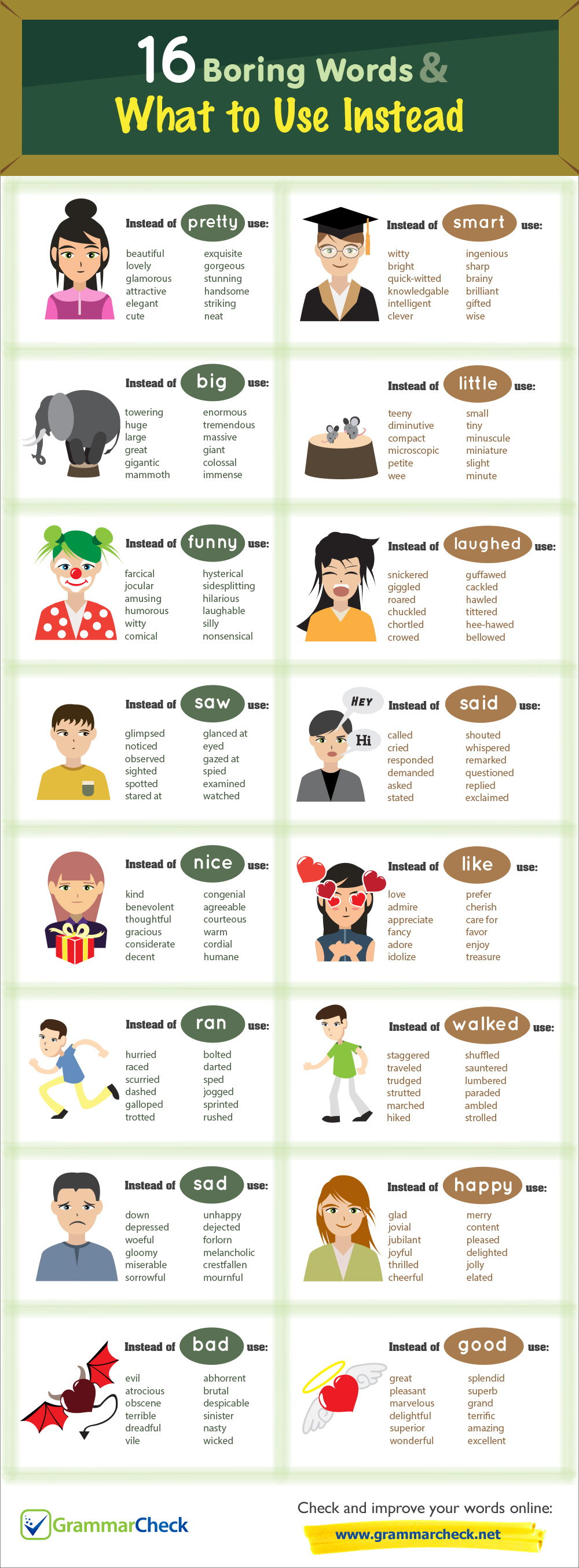16 Word Substitutions to Improve Boring Writing

Writing is a personal and introspective craft that requires a lot of meticulous word choices and ruthless editing to deliver a powerful punch.
And no matter the purpose for your writing, a good way to improve your grammar, language expression, and overall writing effectiveness is to choose words carefully and substitute those boring or weak words that do not bolster your work.
For example, you should generally always substitute jargon, overused words, and uninteresting phrases with stronger, more expressive words that enhance your craft and make it effective. Keep in mind that the sentence fluency of good writing should always feel natural, smooth, and expressive.
But how do you determine which words to substitute in your writing?
Glad you asked...
How to Determine Boring Words to Substitute
To determine if your word choices are the best for your purpose, ask yourself some basic questions:
- Does this word choice fit the tone and style of my writing?
- Are there other terms or word substitutions that compliment this term?
- How does this substitute word change the feel and flow of my writing?
- Do the word substitutions fit with my writing style and purpose?
- Do these substitutions fit with my message? How about with my audience?
Asking these questions can help you instantly identify words to substitute to elevate your writing from boring to exciting and more expressive.
Common Boring/Weak Words and Their Stronger Substitutes
Here are some of the most common and boring words you should substitute in texts to instantly strengthen your writing and make it more expressive:
1. Pretty:
Instead of pretty you can use beautiful, lovely, attractive, etc.
2. Smart:
Instead of smart you can use witty, bright, sharp, intelligent, etc.
3. Big:
Instead of big you can use enormous, gigantic, colossal, massive, etc.
4. Little:
Instead of little you can use tiny, minuscule, teeny, minute, etc.
5. Said:
Instead of said you can use stated, asked, responded, remarked, demanded, questioned, etc.
6. Bad:
Instead of bad you can use atrocious, evil, abhorrent, nasty, wicked, etc.
7. Good:
Instead of good you can use splendid, superb, excellent, pleasant, etc.
8. Nice:
Instead of nice you can use thoughtful, considerate, courteous, cordial, etc
More Boring Words and What to Use Instead - Infographic
Check out this neat infographic below from the folks at GrammarCheck for a list of more boring words, along with a handful of interesting substitutions for each one.
The infographic can make for a handy go-to resource for substituting or replacing common and overused words whenever you want to spruce up you writing. Enjoy!

Read Also: Harvard’s Steven Pinker on How to Be a Great Writer.
>









![The Jobs Artificial Intelligence Will Take Over First [node:title]](/sites/default/files/styles/video_thumbnail_bottom/public/adult-person-interacting-with-futuristic-delivery-robot-jobs-ai-will-take-over.jpeg?itok=fqAnaLcu)








![How Bloodborne Pathogen Training Works for Businesses [node:title]](/sites/default/files/styles/video_thumbnail_bottom/public/man-woman-white-robes-ppe-tube-glass-blood-slide.jpg?itok=2Pjvk9J0)

![Are You Keeping Kids (and Pets) Safe During Pest Control in Your Home? [node:title]](/sites/default/files/styles/video_thumbnail_bottom/public/kids-pet-dog-on-couch-sitted-safe-during-pet-control.jpg?itok=ZrBz3X7U)